Reading Time: 8 minutes
Let’s be honest: we all have our cherished food cravings that crop up from time to time. If you have a penchant for sweets you might find yourself daydreaming about cupcakes, luscious frosting, colourful sprinkles or the creamy delight of ice cream. Alternatively, you might lean towards the savoury side, as a connoisseur of saltiness, eagerly anticipating a bag of crispy chips, a generous serving of French fries, or a tantalising slice of bacon.
Among our favourite indulgences, there exists a spectrum of healthiness, ranging from wholesome to downright unhealthy. Some foods can be deemed among the unhealthiest options available and the worst part is that you might not even be aware of it.
Steering clear of certain foods can pose a challenge, especially when they are meticulously crafted to tantalise the taste buds. Regrettably, while it’s perfectly fine to indulge in your favourite treats, it’s equally important to be well-informed about the contents of the foods you consume. Consumed without moderation or, in some cases, entirely avoided, unhealthy foods can lead to severe health issues.
In our fast-paced lives, it’s easy to overlook the importance of maintaining a nutritious diet. Convenience often takes precedence over nutritional value when we grab food off the shelves. Processed foods, particularly foods that are loaded with sugar, sodium and preservatives are readily accessible, available and cheaper, which is why they continue to be profitable for manufacturers and have undoubtedly saved us time, money and energy in the past. But at what cost?
So, let’s explore some expert insights on foods that might warrant a more limited presence in your diet for the sake of your overall well-being-
Foods with added sugar
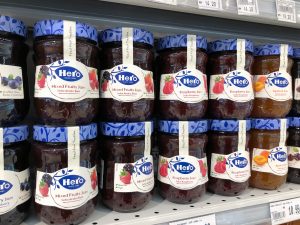
Cookies, cake, ice cream, candy and breakfast pastries, among others, contribute to a list of sugary culprits. A significant portion of the population regularly exceeds the recommended daily sugar intake. Sugar can sneak onto your plate unexpectedly through salad dressing, ketchup or even regular “brown” bread. However, if your breakfast choices include a muffin and you finish your day with a sweet ice cream treat, you’re consciously introducing sugar into your daily diet. Excessive sugar consumption is not good for your overall health. To reduce your sugar intake, it’s advisable to restrict your intake of sugary treats and stop indulging in sugary snacks throughout the day. Consider limiting them to once a day or a few times a week. Additionally, scrutinise food labels and steer clear of products where sugar ranks among the top three listed ingredients.
Foods with added salt
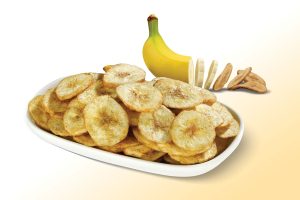
Snacks such as chips, pretzels, breads, crackers, canned soups and processed snacks belong to the group of high sodium culprits. It’s advisable to restrict your daily sodium consumption to 1,500 mg, yet the average person tends to ingest more than twice that amount on a daily basis. Excessive salt can result in elevated blood pressure and an increased susceptibility to heart disease. To reduce your daily sodium intake, minimise your consumption of processed and pre-packaged foods. While grocery shopping, be attentive to product labels. When enhancing the flavour of your meals, opt for the pepper mill or other spices over the salt shaker.
Diet soda
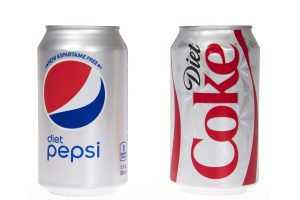
Diet soda is often marketed as regular soda’s healthier sister due to its lack of sugar and calories, making it popular among those watching their weight. However, the use of artificial sweeteners can potentially be more harmful than real sugar. A common ingredient in most popular diet sodas is aspartame, an artificial sweetener initially designed to aid weight loss. However, recent findings suggest it may have the opposite effect by raising glucose levels, stressing the liver, and converting excess sugar into fat. If you consume more than one can of diet soda a day you may unknowingly expose yourself to health risks. Research indicates that diet sodas may not live up to their “diet” image. Artificial sweeteners have been linked to chronic kidney disease, tooth decay due to their acidic pH, and an increased risk of osteoporosis and heart disease. Additionally, these beverages often contain artificial colours and flame retardants.
Artificially flavoured creamer

For most of us, a morning cup of coffee can kick start our day. As most people prefer their coffee to be free from bitterness, they preferably turn to creamer to jazz up their brew. A wide array of artificially flavoured coffee creamers have been injected into the market with unusual flavours like “Coco Mocha” , “White Chocolate Raspberry” or “Dulce de Leche” to name a few. While the addition of a modest quantity of creamer to your coffee is generally acceptable, if you lean towards creating a fancy coffee using excessive amounts of artificially flavoured creamer, it might be worthwhile to reconsider. These creamers are laden with sugar and the artificial flavourings they employ are detrimental for your health.
Canned fruit
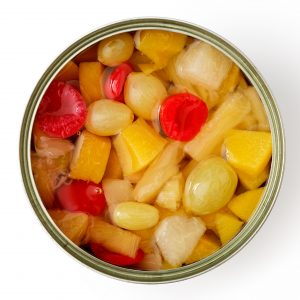
What makes this type of fruit so delectable? It all boils down to one thing: sugar, and plenty of it. When fruit is preserved in ‘light syrup’ or ‘heavy syrup,’ it’s an indication that extra sugar has been introduced to the fruit. Given that fruit naturally boasts its own sweetness, additional sugar is essentially redundant. However, if you appreciate the convenience of canned fruit, there’s a silver lining: you can find canned fruits that are not submerged in a sugary concoction. Just be sure to carefully inspect the ingredient label to verify that the product is canned solely in 100% water.
Sunflower seeds
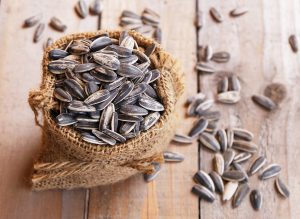
Sunflower seeds are commonly regarded as a nutritious snack however, overindulgence can result in a high caloric intake, potentially leading to weight gain. Researchers have also identified the presence of a specific mould type in some of these seeds that produces harmful toxins. These toxins have the potential to pose a threat to your liver health and elevate the risk of developing cancer. Therefore, if sunflower seeds contain these toxins, their consumption can carry health risks. Additionally, packaged sunflower seeds often contain elevated levels of salt, which, when consumed excessively, can result in excessive sodium intake.
Refined carbohydrates

Refined carbohydrates like white bread and white rice are deficient in crucial nutrients, leading to blood sugar surges and raising your likelihood of inflammation, poor gut health, weight gain, and diabetes. To diminish your consumption of refined carbs, consider switching to whole grain options, such as whole grain bread, pasta, rice and cereals.
Granola bars
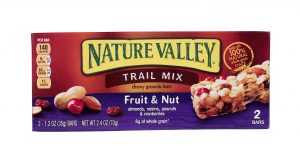
Granola bars market themselves under the guise of being healthy, however most of these pre packaged granola bars contain ingredients that are not good for your health. Full of processed sugars and preservatives they usually have more harmful ingredients than healthy ones.
Processed meats
 Consuming processed meats like cold cuts, hot dogs, sausages and packaged bacon poses serious health risks due to their high salt content and with the World Health Organization classifying it as group 1 carcinogens (cancer causing elements). Such processed meats are linked to an increased risk of cancer and heart disease. To reduce health risks, limit your intake of these smoky, salty foods to occasional treats rather than daily staples. Additionally, it’s wise to be cautious about prepackaged burgers as they may contain uncertain meat quality and undisclosed ingredients like animal byproducts and preservatives.
Consuming processed meats like cold cuts, hot dogs, sausages and packaged bacon poses serious health risks due to their high salt content and with the World Health Organization classifying it as group 1 carcinogens (cancer causing elements). Such processed meats are linked to an increased risk of cancer and heart disease. To reduce health risks, limit your intake of these smoky, salty foods to occasional treats rather than daily staples. Additionally, it’s wise to be cautious about prepackaged burgers as they may contain uncertain meat quality and undisclosed ingredients like animal byproducts and preservatives.
Canned tuna

You’ve probably come across the advice from nutrition experts suggesting tuna as a valuable addition to weight loss regimens. This recommendation is rooted in tuna’s high protein content and low carbohydrate levels. Nevertheless, if you plan to incorporate canned tuna into your daily dietary routine, it’s crucial to be aware of its potential mercury content. Even small traces of mercury can have detrimental effects on your nervous system, immune system and digestive health. Read the labels on the can carefully and opt for fresh fish whenever you can.
Flavoured yogurt cups

Many yogurt brands claim their products promote health, but yogurt cups often contain high levels of sugar, fat and artificial colours. Overconsumption of these flavoured yogurt cups may increase your risk of diabetes, obesity, metabolic and heart issues. Despite their calcium content, it’s essential to consider the associated risks with these flavoured snacks.
Processed sliced cheese

Imitation or sliced cheese frequently comes in deceptive packaging. Rather than containing milk fat, which is a key component of traditional cheese, these products are laden with vegetable oils, trans fats, flavour enhancers and preservatives. These components collectively render imitation cheeses significantly less nutritious compared to genuine cheese. Notably, their notably lower cost can serve as a telltale sign distinguishing them from authentic cheese.
Fruit flavoured white flour based cereal
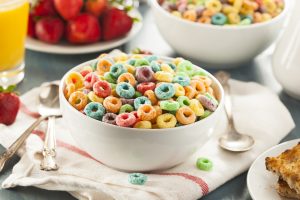
Fruit-flavoured cereals, although tempting, lack actual fruit content and are high in sugar and refined carbs, posing obesity and health risks. Opt for higher-fibre cereals like bran flakes instead of low-nutrition, refined carbohydrate options. High-sugar cereals can lead to various health issues, making them an unhealthy breakfast choice without adequate fibre or protein.
Artificial sweeteners

Indeed, it may seem paradoxical, but it’s advisable to avoid artificial sweeteners. In the past, many individuals opted for diet soda and artificial sweeteners as a sugar substitute, but it’s now understood that these alternatives can pose greater health risks than regular sugar. Moderation with regular sugar is a preferable approach.
Packaged fruit juices and smoothies
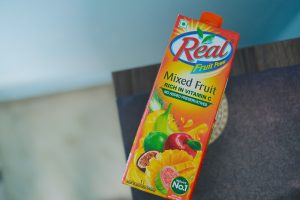
Hectic mornings and quick breakfasts go hand in hand, making store bought smoothies and juices a tempting option. However, these time-saving drinks often contain undesirable elements like added sugars, fibre-deficient fruit,and high-fructose corn syrup. While packaged smoothies and juices may initially appear healthy, many of them lack nutritional value and are packed with calories and sugar that can lead to blood sugar spikes. Additionally, the predominant sweetness in juice originates from fructose, a sugar type associated with the accumulation of visceral fat in overweight individuals. Preparing your own homemade smoothie or squeezing fresh fruit juice (with pulp) may demand more effort, but it enables you to retain valuable fibre and sugar control.
Instant noodles

A useful guideline to follow is to exercise caution when products are labelled as “instant.” The term typically signifies that the food has undergone processes that may result in a loss of essential components, including fibre. While instant noodles are favoured for their affordability and convenience they are notorious for their remarkably high sodium content and the presence of monosodium glutamate (MSG), which is a flavour enhancer associated with its own set of concerns. MSG is frequently used in cooking and restaurants, known to have addictive qualities that can lead to increased appetite. Consuming instant noodles can leave you feeling unsatisfied and their excessive sodium levels can contribute to health issues such as high blood pressure and high cholesterol, among others.
Be sure to think twice before spending your money on these foods and adding it to your daily diet!








